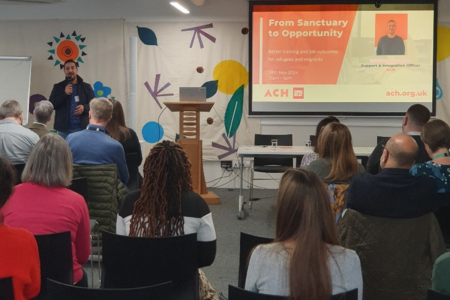
Nationality and Borders Act | The impact so far for people seeking sanctuary
On the 8th December, we held an online seminar to look at the effects of the Nationality and Borders Act so far.
Keep reading to discover more, and hear the analysis of our expert panel...
On the 8th December, ACH held a seminar on the Nationality and Borders Act and it’s impact so far for people seeking sanctuary in the UK. We heard from an expert panel, including:
- Beth Wilson, is the CEO of Bristol Refugee Rights, a charity providing advice, well-being and support services for people seeking asylum and refugees in Bristol.
- Colin Yeo, is a barrister specialising in immigration law and author of Refugee Law (Bristol University Press, 2022) and Welcome to Britain: Fixing Our Broken Immigration System.
- Emma Gaspar Yates, is the Senior Support and Integration Team Leader at ACH, a support and housing provider for refugee and migrant communities in Bristol and the West Midlands.
In a rapidly changing and tumultuous political landscape, our panel discussed how immigration law professionals and refugee and asylum support organisations can prepare, adapt and mitigate the impact for clients facing an uncertain future. They also gave accounts ‘from the ground’, giving testimony into the impact the Act has had so far on people seeking sanctuary in the UK.
The Nationality and Borders Act profoundly threatens the UK’s adherence to the right to seek asylum enshrined in the 1951 Refugee Convention, signed by the UK. The Act criminalises ‘irregular’ asylum routes, creating a ‘two-tier’ system of asylum whilst failing to provide a commitment to safe and legal routes.
Catch up with the full workshop here, or access presentation slides here.
Keep reading to discover the key themes from the discussion we’ve drawn out…
Before we get into the Nationality and Borders Act, what does the asylum context in the UK look like?
Colin
‘To some degree, the number of arrivals has increased, but the real problem is that the number of decisions hasn't kept pace, and has declined. The result of that is, a massive increase in the asylum backlog. There are over 140,000 people waiting for asylum decisions.
The Home Office doesn't release data on the average waiting time for a decision, but we understand it to be years essentially. It looks like people are waiting 2, 3, 4 years for a decision on an asylum claim.’
How does the Nationality and Borders Act propel the differential treatment of people seeking asylum?
Colin
‘One of the big headline policies that was announced through the legislation was differential treatment. With my lawyer's metaphorical hat on, I can say that this differential treatment idea, which is the idea that depending on how you arrive in the UK, you'll be treated differently as a refugee.
So if you arrive by the safe and legal route, and there are substantial safe and legal routes, but they're limited only to certain countries, Hong Kong, Ukraine and also a scheme for Afghanistan. There's also theoretically a scheme for others around the world, they're [The Home Office] just failing to operate it.
If you arrive through those routes, you'll be treated in one way. If you arrive by an ‘irregular route’ say, in a small boat or in the back of a lorry, then you'll be treated in a different way.
Now, they didn't need an act of Parliament to do this.’ – Colin Yeo
Emma
‘So the Nationality and Borders Act introduces this idea of differentiating refugees based on their mode of arrival. So the main things that we're looking at here is group one refugees. Who are they and group two refugees.
Who are they? So Group 1 refugees are going to be people that have come to the UK directly from the country or territory where life or freedom, if threatened, and that they have presented themselves without delay to the authorities. Everybody else will fall into Group 2.
Who is Group 2?
There is not a way for most people to apply for protection in the UK without getting here. There's not an asylum visa. Many newspapers talk like there is, there is not one.’
Beth
‘There's a real sense of a kind of underpinning philosophy from the Act that people who come through irregular means should be penalized and are less worthy than people who come through recognized routes. Different systems will apply depending on people's arrival date and there are different processes that will apply to people depending on when they arrive and how they arrive.
In very recent times we've started to see a push by the Home Office to progress cases of people who have arrived since the end of June when some aspects of the Act came into force.’
How will the Act impact on mental health for people seeking sanctuary?
Beth
‘I think one of the biggest things that we are seeing is the damage that is happening to people's mental health. The fear that it's creating anxiety, confusion, and tension. Many of the people that we see have already experienced multiple layers of trauma, firstly in their home country before they have fled.
Secondly, in some cases, people have experienced trauma on their journey to the UK. For some that journey has lasted many months and they might have experienced exploitation. And almost certainly fear as they have literally fled for their lives. And then on arrival they're faced with this incredibly dehumanizing asylum system, which confuses them.
And as Colin has said, increasingly criminalizes them. We are hearing a lot of anxiety from people, being worried about being sent to Rwanda, even though, for lots of the people that we've heard that from, there is absolutely no chance that it would apply to them because of their arrival date or their means of arrival.’
What are the consequences for refugee integration under Temporary Protection status?
Emma
‘People are certainly going to have to deal with increased uncertainty about their futures. Previously, you would be given 5 years and then, a route to resettlement after 5 years. This meant you could start planning for your life in a long-term fashion.
I think this new system is going to keep people in limbo for longer, you’re now looking at a minimum of 11 years before people will be able to apply for British Citizenship.
These delays, I think, will create further barriers to people’s integration. This could be the psychological impact of having the stress of reapplying every 2.5 years. It could be logistical issues making applications. And it could be planning – would you try and establish, say, a business if you don’t know if you’ll be here in 2.5 years? Would you start a university course?’


